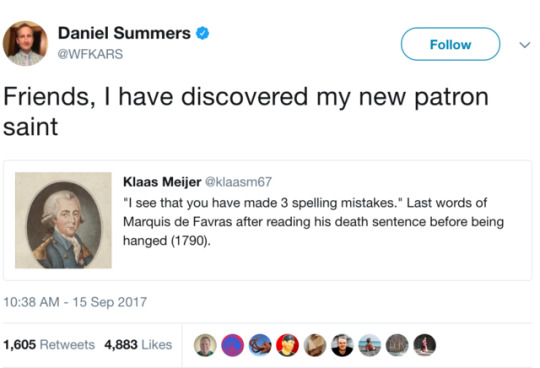Photo
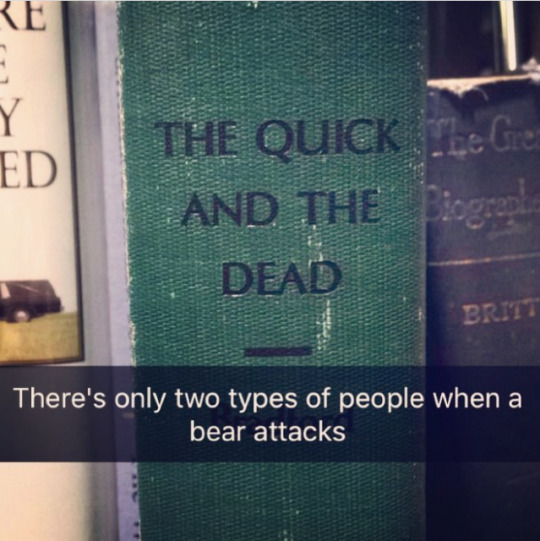
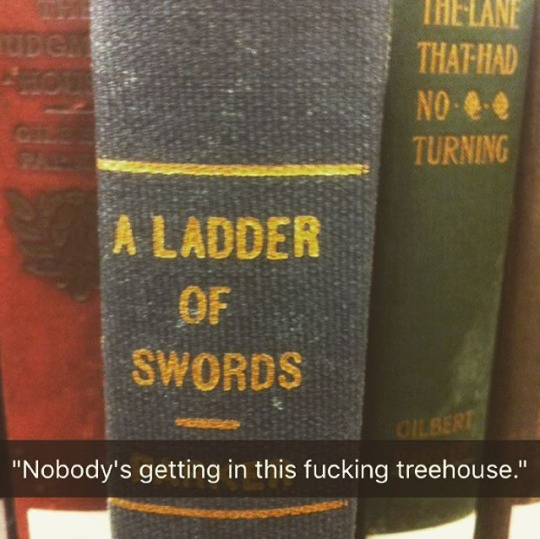
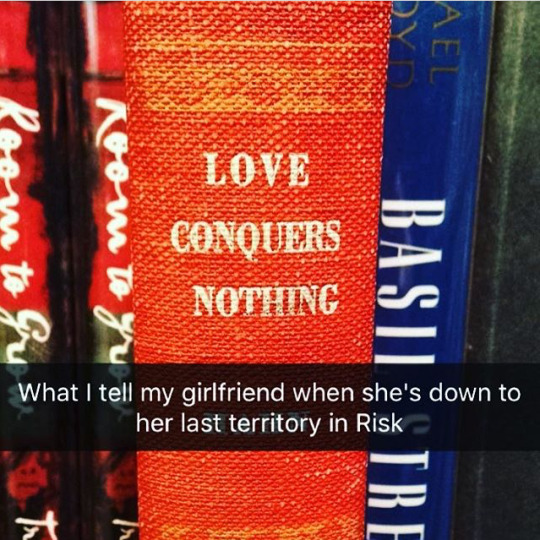


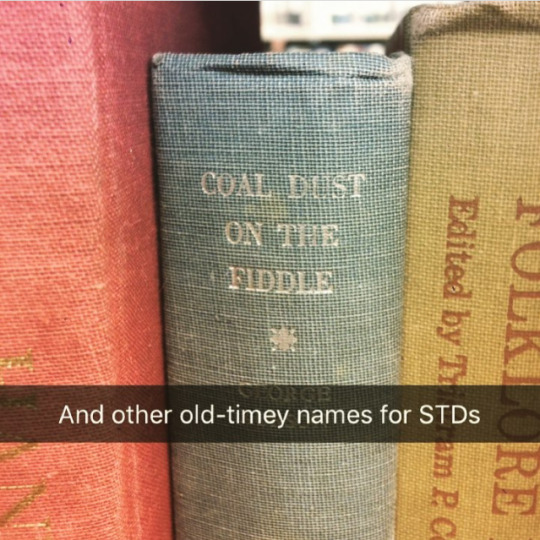
‘creative captions for old-timey books’ by SnideOctopus
254K notes
·
View notes
Text
When your characters aren't acting how they are supposed to...

Original Twitter post from my account.
738 notes
·
View notes
Quote
Odd how a book can tuck galaxies and planets, history and myth, love and hate inside its pages. It’s only paper.
(via bookeworm94)
4K notes
·
View notes
Text
Hear hear!
WRITE FOR YOURSELF. ALWAYS.
why is it that every time a fic writer says in the tags/description/notes that their fic is self-indulgent or calls it the “______ AU that nobody asked for,” the fic ends up being… really good…
1K notes
·
View notes
Note
When to use a dash vs ellipses? I keep misusing them. I'll look it up for clarity and still can't get the difference to stick in my head. I'm hoping you can explain in a way that clicks with me.
You know why you can’t get clarity? Because the English language and grammar are fucked up and unnecessarily complicated. But I’ll do my best, and screw all those technical explanations.
A dash (also called an em dash, but nobody uses that term so who cares) indicates:
1. An interruption or break in speech. Ex:
“But he told me to-”
“I don’t care what he told you, you take orders from me!”
Basically, it’s when some rude motherfucker cuts you off.
2. A break in a thought/statement or skipping from one to another. Ex:
“I was going to tell you-I wanted to tell you-where I went last night but I was afraid you’d get angry.”
Basically, it’s when you cut yourself off.
3. Preceding an explanation or details, almost like parentheses. Ex:
“Joe-the guy I met at the party last weekend-texted me today.”
Basically, it’s when you’re clarifying something you’re saying.
Dashes are not to be confused with hyphens, which are used within words, to separate parts of a compound word. Ex: close-up, half-assed, back-up
Basically, when you’re sticking two words together to make one word.
An ellipsis is used to indicate a pause within a sentence or a trailing off at the end. Ex:
“I’m thinking about going out with him…but he’s kind of weird.” or
“I don’t know if I’ll say yes, he’s kind of weird…”
Basically, it’s when you can’t think of what to say, but then you do think of it; or when you can’t think of what to say so you just don’t finish the thought/statement.
As I recommend with most grammar questions, when you’re unsure, read it aloud to yourself. If you read the sentence aloud and the break is abrupt, like getting cut off, use a dash. If it sounds like more of a long pause, or a trailing off, use an ellipsis.
I hope this helps. Isn’t grammar stupid?
32 notes
·
View notes
Text
Allow me to add to this, please.
REIGN - to rule, to dominate, to hold power
REIN - to control, hold in check, curb (based on the usage of reins on a horse harness)
You do not REIGN yourself in, you REIN yourself in.
ALSO
The past tense of LEAD is not LEAD. It is LED.
LED.
LED.
IT’S NOT ‘PEEKED’ MY INTEREST
OR ‘PEAKED’
BUT PIQUED
‘PIQUED MY INTEREST’
THIS HAS BEEN A CAPSLOCK PSA
686K notes
·
View notes
Link
93 notes
·
View notes
Quote
The most basic rule of editing is that if you can’t bear to read it, no one else can either. So when you find yourself skimming, commit murder.
Marion Roach Smith
(via writingdotcoffee)
4K notes
·
View notes
Text
“This is your daily, friendly reminder to use commas instead of periods during the dialogue of your story,” she said with a smile.
563K notes
·
View notes
Link
How to End a Story
by The Magic Violinist
Endings are hard. Nobody likes to say goodbye, and saying goodbye in a story is especially hard. The pressure is on to get that last part just right and determine how to end a story well.
When there are so many possibilities for a conclusion, how do you know which one is right for your story?
4 Classic Possibilities for How to End a Story
Before you can choose an ending, you need to figure out what your choices are. Here are a few basic ones to get you started.
1. The “happily ever after” ending
The classic, feel-good ending. Disney is the master at this. Every character meets their goals (except for the villain, of course), the romantic couple gets together (they might even get married), and you finish the story feeling like you can accomplish anything.
This sort of ending goes along best with fairytales and most children’s stories. That’s not to say stories for adults can’t have this kind of ending, too, but it works to perfection when the story already has a light and happy quality to it. You don’t want to write a depressing plot only to wrap it all up in the last chapter. It’ll throw off your reader and make the conclusion seem far-fetched.
2. The tragic ending
The protagonist’s main goal doesn’t go as planned, curveballs are thrown, and tragedy strikes. These are tricky to write, because there’s a fine line between writing a tragic, artistic ending and a conclusion that will leave your reader in a hopeless slump.
If you’re planning on having an unhappy ending, you’ll need to foreshadow that throughout the story. Have a slightly gloomy, ominous tone from the very beginning. Your reader might not expect it, exactly, but it won’t come as a total shock, making it an easier ending to swallow.
But, remember to have some bright moments, little nuggets of happiness the reader can hang onto after the story is finished.
3. The ambiguous ending
This isn’t everyone’s cup of tea, but it’s one of my favorites. The ambiguous ending goes well with an “indie” story. A simple plot—usually something contemporary, but not necessarily—works best, because it focuses most on the characters, leaving a lot up to the reader’s imagination when it comes to what happens after the story is finished.
If you do decide to go with this ending, remember that there’s a huge difference between ambiguity and unfinished business. If you drop the plot too suddenly, the reader wonders if there are pages missing from the end of the book, if something’s gone wrong. What you want to do is drop enough hints that someone can come close to determining what will happen, but they’ll never know for sure.
4. The bittersweet ending
Sometimes this can even pair with the ambiguous ending, but it doesn’t have to. This conclusion might look like the protagonist failing to meet their goal, but finding something else along the way. Maybe the main couple doesn’t get together, but they’ve found happiness apart from each other.
Make the ending unexpected, but hopeful. The reader will be pleasantly surprised and leave the story with a sense of calm and satisfaction.
End Your Story Well
Maybe you knew how your story would end when you started writing it. Maybe you’re on the next-to-last page and you still don’t know. Whatever the case, these four options for how to end a story can get your imagination flowing. How will your story end?
132 notes
·
View notes
Note
Hey bud! So in the book that I'm writing one of the problems I ran into is how to write a character who has emotions but chooses not to feel them. I don't know how to write it to where you (the figurative read would understand that he's not exactly emotionless). I also don't know much about writing a mysterious person but would love to step to of my comfort zone. Could you possibly help? Sorry this was so long
Hey! Sorry for the wait, been busy. I’ve gotten a couple asks about writing “emotionless” characters who aren’t actually emotionless. The term you all are looking for in that case is inexpressive or even stoic, taciturn, reserved, emotionally withheld, etc. Not trying to correct you, I just know that finding the right descriptive word(s) for my characters made them easier to write and explain.
I’m going to hand the reins over to @lets-get-fictional here because they made a post about this that was better than anything I’ll cobble together (x).
Re: mysterious person, here is an ask I answered about that too (x), and just Googling “writing mysterious character” came up with some relevant links too.
~ Thanks for asking!
31 notes
·
View notes
Text
Read This or Die
I have a fondness for post series, so I’ve decided to do one of books I recommend. I assure you, these are essential to survival.
I’m using the summaries from Amazon.com because if I give my own synopsis I’ll likely give something away.
Today’s book:

Microserfs by Douglas Coupland
From Amazon.com:
“They are Microserfs—six code-crunching computer whizzes who spend upward of sixteen hours a day "coding" and eating "flat" foods (food which, like Kraft singles, can be passed underneath closed doors) as they fearfully scan company e-mail to learn whether the great Bill is going to "flame" one of them. But now there's a chance to become innovators instead of cogs in the gargantuan Microsoft machine. The intrepid Microserfs are striking out on their own—living together in a shared digital flophouse as they desperately try to cultivate well-rounded lives and find love amid the dislocated, subhuman whir and buzz of their computer-driven world.”
My brief comments: This book is funny, ironic, irreverent, infusing, and oddly touching. Coupland is one of my top three novelists.
1 note
·
View note
Text
Blog Recommendation
I’m trying to collect various helpful writing resources and put them all in one tidy, convenient post, but until I complete that, I’m just going to post blogs I recommend as I encounter them.
Today’s recommendation: @scriptmedic
This blog is a fantastic resource for all things medical you may want to befall your characters. Please utilize this person’s knowledge, because ACCURACY IS IMPORTANT. Obviously in AUs or sci-fi settings there is some flexibility with the physiology of the human body, but a majority of the time, you best know what you’re talking about. When a scene seems implausible or inaccurate, it is detrimental to the rest of your story. The best piece of writing advice I have ever heard:
Write what you know. If you don’t know, ask someone who does.
Note: There is actually a whole script family on Tumblr that is extremely helpful in many areas of specialty, but @scriptmedic is the one I find myself consulting most often.
1 note
·
View note
Text
Words to replace said, except this actually helps
I got pretty fed up with looking for words to replace said because they weren’t sorted in a way I could easily use/find them for the right time. So I did some myself.
IN RESPONSE TO
Acknowledged
Answered
Protested
INPUT/JOIN CONVERSATION/ASK
Added
Implored
Inquired
Insisted
Proposed
Queried
Questioned
Recommended
Testified
GUILTY/RELUCTANCE/SORRY
Admitted
Apologized
Conceded
Confessed
Professed
FOR SOMEONE ELSE
Advised
Criticized
Suggested
JUST CHECKING
Affirmed
Agreed
Alleged
Confirmed
LOUD
Announced
Chanted
Crowed
LEWD/CUTE/SECRET SPY FEEL
Appealed
Disclosed
Moaned
ANGRY FUCK OFF MATE WANNA FIGHT
Argued
Barked
Challenged
Cursed
Fumed
Growled
Hissed
Roared
Swore
SMARTASS
Articulated
Asserted
Assured
Avowed
Claimed
Commanded
Cross-examined
Demanded
Digressed
Directed
Foretold
Instructed
Interrupted
Predicted
Proclaimed
Quoted
Theorized
ASSHOLE
Bellowed
Boasted
Bragged
NERVOUS TRAINWRECK
Babbled
Bawled
Mumbled
Sputtered
Stammered
Stuttered
SUAVE MOTHERFUCKER
Bargained
Divulged
Disclosed
Exhorted
FIRST OFF
Began
LASTLY
Concluded
Concurred
WEAK PUSY
Begged
Blurted
Complained
Cried
Faltered
Fretted
HAPPY/LOL
Cajoled
Exclaimed
Gushed
Jested
Joked
Laughed
WEIRDLY HAPPY/EXCITED
Extolled
Jabbered
Raved
BRUH, CHILL
Cautioned
Warned
ACTUALLY, YOU’RE WRONG
Chided
Contended
Corrected
Countered
Debated
Elaborated
Objected
Ranted
Retorted
CHILL SAVAGE
Commented
Continued
Observed
Surmised
LISTEN BUDDY
Enunciated
Explained
Elaborated
Hinted
Implied
Lectured
Reiterated
Recited
Reminded
Stressed
BRUH I NEED U AND U NEED ME
Confided
Offered
Urged
FINE
Consented
Decided
TOO EMO FULL OF EMOTIONS
Croaked
Lamented
Pledged
Sobbed
Sympathized
Wailed
Whimpered
JUST SAYING
Declared
Decreed
Mentioned
Noted
Pointed out
Postulated
Speculated
Stated
Told
Vouched
WASN’T ME
Denied
Lied
EVIL SMARTASS
Dictated
Equivocated
Ordered
Reprimanded
Threatened
BORED
Droned
Sighed
SHHHH IT’S QUIET TIME
Echoed
Mumbled
Murmured
Muttered
Uttered
Whispered
DRAMA QUEEN
Exaggerated
Panted
Pleaded
Prayed
Preached
OH SHIT
Gasped
Marveled
Screamed
Screeched
Shouted
Shrieked
Yelped
Yelled
ANNOYED
Grumbled
Grunted
Jeered
Quipped
Scolded
Snapped
Snarled
Sneered
ANNOYING
Nagged
I DON’T REALLY CARE BUT WHATEVER
Guessed
Ventured
I’M DRUNK OR JUST BEING WEIRDLY EXPRESSIVE FOR A POINT/SARCASM
Hooted
Howled
Yowled
I WONDER
Pondered
Voiced
Wondered
OH, YEAH, WHOOPS
Recalled
Recited
Remembered
SURPRISE BITCH
Revealed
IT SEEMS FAKE BUT OKAY/HA ACTUALLY FUNNY BUT I DON’T WANT TO LAUGH OUT LOUD
Scoffed
Snickered
Snorted
BITCHY
Tattled
Taunted
Teased
Edit: People, I’m an English and creative writing double major in college; I understand that there’s nothing wrong with simply using “said.” This was just for fun, and it comes in handy when I need to add pizzazz.
783K notes
·
View notes
Photo
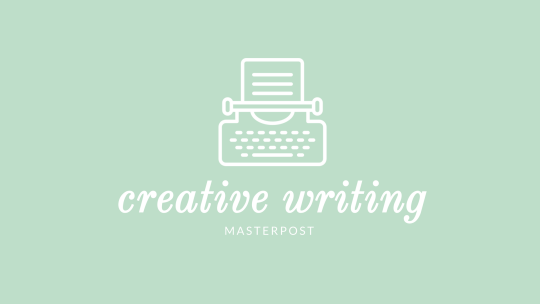
Hey guys! As a writer myself, it’s hard to have a lot of resources for writing in one place. That’s why I decided to create this masterpost, and maybe make more if I find future resources. I hope you like it, and expect to see more masterposts like this in the future!
Generators
Character
Appearance Generator
Archetypes Generator
Character Generator
Character Traits Generator
Family Generator
Job/Occupation Generator, (II)
Love Interest Generator
Motive Generator
Name Generator
Personality Generator, (II)
Quick Character Generator
Super Powers Generator
Names
Brand Name Generator
Medicine Title Generator
Name Generator
Quick Name Generator
Vehicle Generator
Town Name Generator
Plot
First Encounter Generator
First Line Generator, (II)
Plot Generator, (II), (III)
Plot Device Generator
Plot Twist Generator
Quick Plot Generator
Setting/World-Building
City Generator
Fantasy Race Generator
Laws Generator
Pet Generator
Setting Generator
Species Generator
Terrain Generator
Prompts
Subject Generator
”Take Three Nouns” Generator
Word Prompt Generator
Misc
Color Generator
Decision Generator
Dialogue Generator
Journey Generator
Title Generator, (II), (III)
Some Tips
Just a few I found from the writing tips tag!
Writing action / @berrybird
How to create a strong voice in your writing / @collegerefs
How to plot a complex novel in one day! / @lizard-is-writing
8 ways to get past writer’s block / @kiramartinauthor
psa for writers / @dasakuryo
”Write Using Your 5 Senses” / @ambientwriting
How People Watching Improves Your Writing / @wherethetransthingsare
Writing Science Fiction: Tips for Beginners / @fictionwritingtips
Creating Likeable Characters / @authors-haven
Vocabulary
Descriptive words / @somekindofstudent
Words to replace “Said” / @msocasey
Obscure color words / @mintsteelpeachlilac
Words to spice up your stories / @busyibee
Words to describe someone’s voice
Words to Use Instead of Very / @gaybybirth
Touchy Feely Words / @gaybybirth
Some Advice
Stephen King’s Top 20 Rules for Writers
”But my plot isn’t UNIQUE or BIG enough!” / @youreallwrite
8 Things Every Creative Should Know / @adamjk
(How To) Get Over Comparing Yourself to Other Creatives / @adamjk
How to Get Over Common Creative Fears (Maybe) / @adamjk
14 Tips From Stephen King On Writing / @i-can-give-you-prompts
Playlists
Electronic Thoughts / @eruditekid
“Mix About Writing” An Instrumental Mix / @shadowofemirates
Shut Up, I’m Writing! / @ninadropdead
Chill / @endlessreveries
Breathtaking Film Scores / @tweedskirts
Music to Write to Vol. 1: Starlight / @crestadeen
Music for Written Words / @ghoulpatch
Dead Men Tell No Tales / @scamandersnewt
Fatale / @dolcegf
All These Things that I’ve Done / @referenceforwriters
Feeling Soaking into Your Bones / @verylondon
I Can Feel Your Pulse in the Pages / @rphelper
Morally Ambiguous / @scamandersnewt
Wonderwall / @wheelerwrites
Pythia / @mazikeene
Ballet: To Dance / @tanaquil
Websites and Apps
For Writing
ZenPen: A minimalist writing website to keep you free of distractions and in the flow.
The Most Dangerous Writing App: A website where you have to keep typing or all of your writing will be lost. It helps you keep writing…kind of. You can choose between a time or word count limit!
Evernote: An online website where you can take notes and save the product to your laptop and/or smartphone!
Writer, the Internet Typewriter: It’s just you and your writing, and you can save your product on the website if you create an account.
Wordcounter: A website to help check your word and character count, and shows words you’re using frequently.
Monospace: An Android app for writing on the go when you feel the inspiration, but you don’t have your laptop on you!
For Productivity
Tide: An app that combines a pomodoro-esque timer with nature sounds and other noises! (Google Play / Apple Store)
ClearFocus: An Android app with a pomodoro-type time counter to let you concentrate easier and stay productive.
Forest: An app with a time counter to keep you focused and off your phone, and when you complete the time limit, a tree grows in your garden! (Google Play / Apple Store)
SelfControl: A Mac downloadable app that blocks you from distracting mail servers, websites, and other things!
Prompt Blogs
@writeworld
@dialouge-prompts
@oopsprompts
@prompts-for-the-otp
@creativepromptsforwriting
@the-modern-typewriter
@theprofessionalpromptmaker
@writers-are-writers
@otp-imagines-cult
@witterprompts
@havetobememes
@auideas
@putthepromptsonpaper
@promptsonpaper
@fyotpprompts
@otpisms
@soprompt
@otpprompts
@ablockforwritersblock
@awritersnook
Writing Tips Blogs
@writeworld
@anomalously-written
@awritersnook
@clevergirlhelps
@referenceforwriters
@whataboutwriting
@thewritershelpers
@nimblesnotebook
@slitheringink
101K notes
·
View notes

